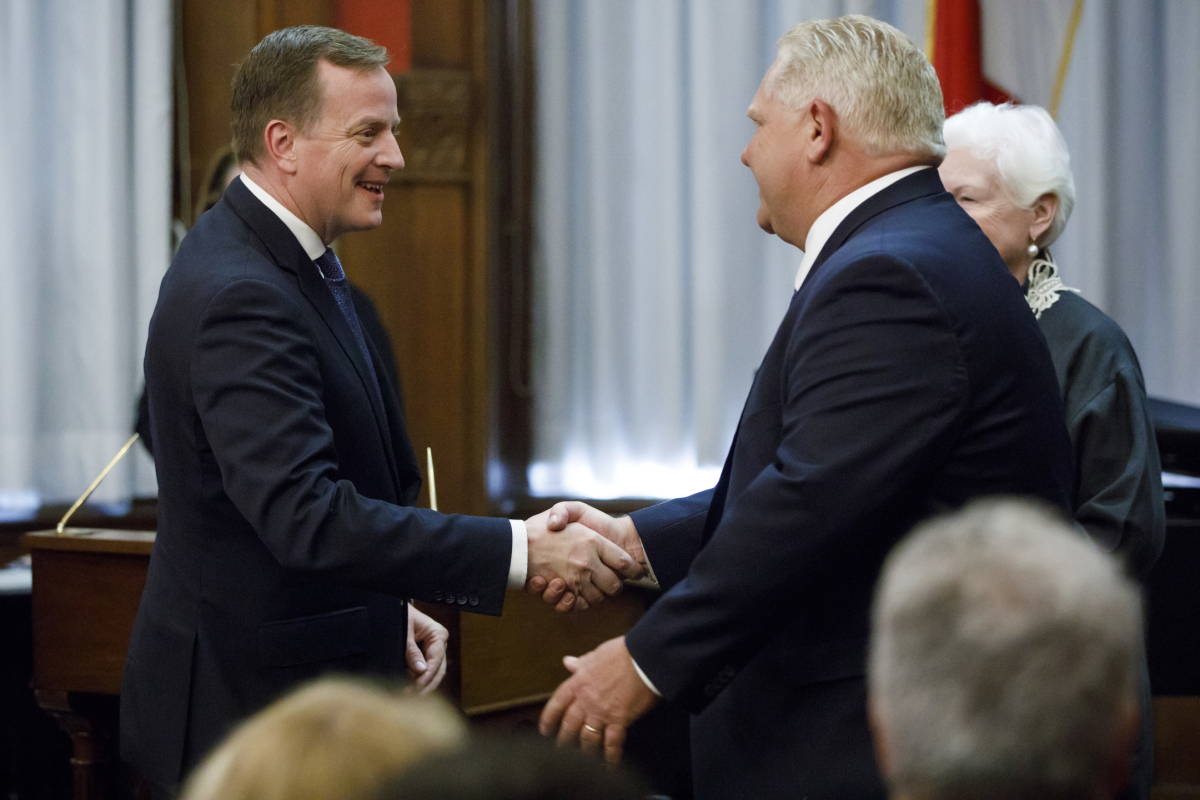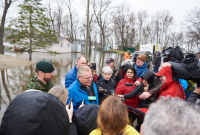Support strong Canadian climate journalism for 2025
The Doug Ford government has, without warning or consultation, ordered the authorities that protect Ontario's watersheds to "wind down" unnecessary programs.
National Observer has learned that conservation authorities and municipalities received letters addressed from Environment and Conservation Minister Jeff Yurek on Aug. 16 ordering them to shut down programs that do not relate to their "core mandate" without specifying what this mandate is.
In light of this memo, environmentalists are now concerned this leaves the province without the necessary protections from increasingly severe floods.
The letter came without warning or consultation, according to Kim Gavine, general manager of Conservation Ontario, the authority that represents Ontario's 36 conservation authorities.
"I was surprised and then disappointed because I thought we were working in good faith with the province... to identify what the non-core programs would be and that we had time to figure that out," Gavine said in an interview.
Gavine said conservation authorities were in discussions for months "in good faith" to see the government's proposed regulation to figure out what programs the government wanted them to discontinue in consultation with their member municipalities and partner groups. They had met with the municipal affairs minister, natural resources minister and Yurek's predecessor, Rod Phillips (who was appointed as finance minister after a cabinet shuffle).
"We have this memo, but we hadn't had the discussion," she said. "We don't know what 'core mandate' means for the government. Is water quality and monitoring considered core? Are flood programs core?
Conservation authorities’ provincial funding for natural hazards was reduced by 50 per cent earlier this year. Following that, an omnibus bill about housing indicated that changes would be forthcoming to the regulations guiding conservation authorities. These changes included a broad list of programs and services that Yurek also referenced in his letter, which was shared with National Observer.
Yurek recommended that the authorities "re-focus their efforts on the delivery of programs and services" related only to the following five issues:
- Risk of natural hazards
- Conservation and management of land owned or controlled by conservation authorities
- Drinking-water source protection
- Protection of the Lake Simcoe watershed
- Other programs or services as prescribed by regulation

Andrew Buttigieg, a spokesman for Yurek, told National Observer in an email that the Ford government "is working to improve public transparency and consistency."
"Bringing conservation authorities back to their core mandate will allow for municipalities to better manage conservation authority budgets and programs. The legislative changes we’ve made ensure conservation authorities focus on delivering core services and programs that protect communities from natural hazards and flooding while using taxpayer dollars efficiently and effectively," Buttigieg wrote.
"Over the years, conservation authorities have expanded past their core mandate into activities such as ziplining, maple syrup festivals and photography and wedding permits. We are giving municipalities greater control and the ability to enter into agreements with conservation authorities to fund any programs and services outside of the core mandate if they chose," Yurek's spokesman said.
But Gavine said conservation authorities do more than that. These bodies provide a wide variety of watershed-management programs in partnership with all levels of government. These programs help to reduce or prevent the costly and devastating damages of flooding, protect water resources, help to reduce pollution from getting to the Great Lakes and support healthy watersheds. They also used data collected through environmental monitoring programs to produce report cards to indicate where the health of a watershed is good and where it's poor, to better help the province understand where climate priorities lie.
All this could be under threat, one expert who works with an Ottawa-area conservation authority, and who chose to remain anonymous, told National Observer. Future evidence of water pollution could be lost, as could many jobs including: stewardship jobs, fieldworkers, technicians that collect data and report on it and anyone else whose job it to synthesize the data.
"We are the boots on the ground... to preserve, restore and protect the natural environment in Ontario. This has been a mandate long embraced since the 1940s," Gavine said. "We need (the government) to define those non-core activities. What are the activities that we are doing that are not considered core?"
'A return to a world without climate change'
In his letter, Yurek urges conservation authorities to "refrain from developing new policies that are not aligned with your mandate or with provincial policies" as he undergoes a full review of "all the relevant legislation and regulations that govern Ontario's conservation authorities to explore even more opportunities to re-focus their efforts and to ensure they are best serving the interest of the people of Ontario."
The letter says the changes the government has made to conservation "will give greater control to individual municipalities on conservation authority programs and budgets."
Kelsey Scarfone, Environmental Defence's water program manager, told National Observer that the government was "jumping the gun" in making this order.
"There hasn't been a consensus on what the non-core programs are," she said.
The list Yurek provided also leaves out natural resources programs that protect Ontario's Great Lakes from pollution, Scarfone said, noting that "only conservation authorities have the knowledge and expertise about the areas to protect us in a holistic way from floods."
The memo's instruction is "a step in the wrong direction," Scarfone added. "Our watershed-management framework was born out of all the devastation during hurricane Hazel...This move undercuts all the work we've done since then in a major way."
In a statement to National Observer, federal Environment Minister Catherine McKenna said the government's instruction to conservation authorities was a continuation of "the Conservative cut first, think later approach."
"Conservative politicians say they're 'for the people' but then they make devastating cuts to programs and services that Canadians rely on," McKenna said. "Conservation authorities look after our nature, and they look after our water to protect Ontarians from flooding, and ensure they can drink, swim, and fish in it. Doug Ford is threatening to cut funding for flood management at time when Ontarians are still suffering from this summer’s flooding, and he is threatening to put at risk the very water that we drink."
"This is what Conservative politicians do," she added. "We saw this during the decade of inaction under Stephen Harper, and we can expect to see more of the same from Andrew Scheer."
Greenpeace's Keith Stewart said Yurek's instruction is "a return to a world without climate change."
"It's a major step backwards," he said in an interview. "We live in a world that's changing rapidly... Conservation authorities have a huge role to play in this new world of severe weather."
Editor's note: This story was updated on August 19, 2019 at 9:45 p.m. EST to include the government's statement. It was updated again on August 20, 2019 at 1:16 p.m. to include Catherine McKenna's statement.






Comments
Last time around, "common sense" Mike Harris did not think drinking water was essential. The people of Walkerton paid the price.
Who will pay this time?
"Common sense, for the people" seems to be an agenda that reduces government to the lowest common denominator, strips from it the knowledge and capacity to prevent disasters, to protect us in the future and is aimed at degrading further the already badly damaged natural environment, the environmental determinants of human and non-human life and health. Who beneifts? Those whose wealth and power is based on the despoiliation of the planet on which we depend. Eventually, even those thieving psychopaths will run out of ways to increase their wealth and go down in flames along with their ill-gotten gains.
The last Conservative Government we had in Alberta, put in the glorious text on environmental protection that ran the front page. Behind the scene, they decimated the staff that was to enforce these laws. There wasn't enough staff left to answer phones properly
It seems to me the reply should be something like " All we do is essential, and as it is, much more is essential if the funds were available" "If present funds are to be cut give us the amount and we will document the parts dropped and the best estimate of collateral loss in environmental and human wellbeing."